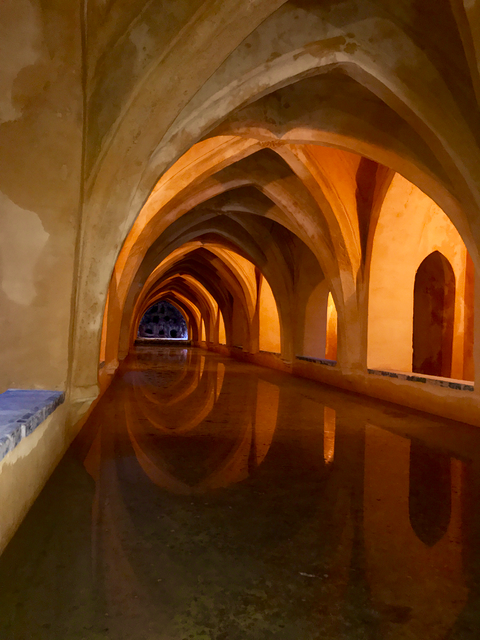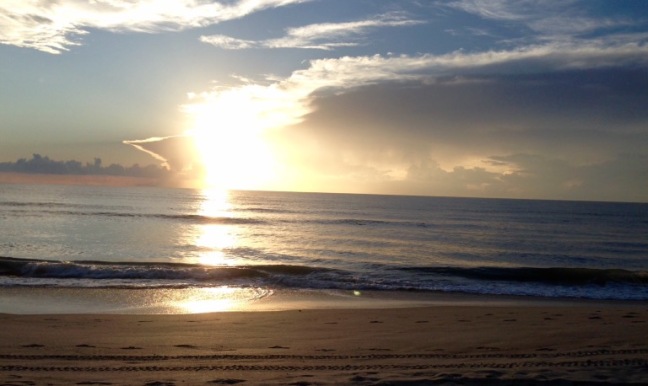The last time I was in Seville, around 1986, I was visiting the Alcázar. Among us, 5 high school students and two chaperones. We plucky teenagers pranced around with our daypacks, stuffed with caribeeners, compasses, flashlights, dry matches and a copy of “501 Spanish Verbs” (from Barron’s Educational Series) – what do you expect from an outdoorsy curriculum?
Pretty sure we all came packing Swiss Army knives, too, as you could travel with them back then. (Note that Victorinox lost ~40% of their business after 9/11 – they used to be a featured item in Duty Free airport shops – but they didn’t fire a single employee: fun read if you want to look it up.) We also had a change of clothes as we were on an overnighter.
In the Plaza de España, Mr. Gaul offered to sit and watch our bags as we traipsed about the cobblestone streets, past cafés with hanging legs of drying jamón, steaming cups of café con leche, and decorative Moorish tiles. When I walked into the plaza a couple hours later, I saw Mr. Gaul bent over the edge of the fountain. A large map splayed out before him, he was examining it while an unfamiliar man in a ratty white linen shirt gesticulated, pointing and asking questions.
I couldn’t understand what the man was saying. It didn’t sound like Spanish. It might have been Arabic, but I couldn’t distinguish those sounds well at that age. To this day, I’m not sure what he was speaking, though I’m rather confident it was complete gibberish.
The man made eye contact with me, and in a flustered huff like a suddenly shamed rooster, he scooped all edges of the crinkley paper map into his arms, waved at Mr. Gaul as if to say, “So sorry for the trouble, thanks for trying to help,” spluttered out some more nonsense words, and beat a hasty retreat into the crowds of the city.
“Who was that?” I started to ask, as Mr. Gaul turned around, looking at me while taking his seat. His head swiveled this way and that. “Oh crap,” he said, eyes shifting and arms spreading wide. “One of our bags is gone.”
Sevilla para herir.
Córdoba para morir.
¡Siempre Sevilla para herir!
– Francisco Lorca
A crossroads city where the Tartessians, Cathaginians, Iberians, Romans, Visigoths, and Moors set roots. Where Jews, Muslims, Christians settled. Where Christopher Colombus embarked (along with Amerigo Vespucci, and de Gama, and Cortéz, …). Where a monopoly was granted for “trade” with the Americas. Where the gitanos danced and wooed and… yes, a few shucksters aspired to perfecting the art of the grift.
Such a rich confluence, this city that periodically washed away in the alluvial soil on the banks of the Guadalquivir, also experienced dramatic intermixing of culture, thought, religion, practice, music, architecture, plagues, iconoclasm, iconography… I can’t help put try to peer through the layers of interwoven blending.
Pagan sites became churches, churches became mosques, mosques became repositories of Hebraic knowledge, then became churches again, then became institutions of state government, then became trading houses, then became gardens, became tourist attractions, became graffitied, sighed and lamented and rejoiced all together.
This city founded a Universidad de Mareantes (of the Mariners) around 1500 with faculty teaching piloting, sailing, cosmography, mathematics, astronomy, artillery tactics, military history, navigation, cartography. These three pictures are details from a massive tapestry hanging in the Alcázar (roughly 40 feet by 25 feet) with the Mediterranean sea at the top and the Atlantic to the east. Zooming in reveals lots of interesting tidbits. It may be representative of the jealously guarded Padrón Real.
My favorite place – probably the old Moorish baths underneath the palace:









































